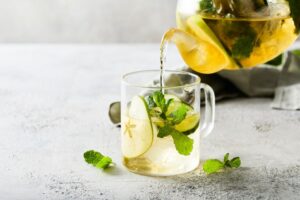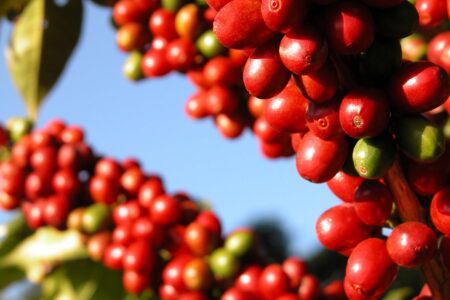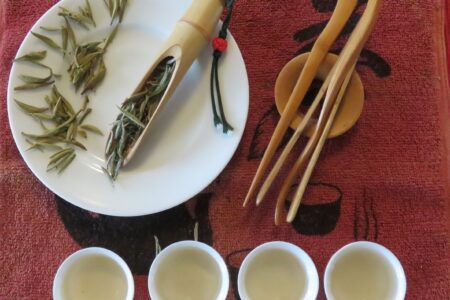Consumers’ desire for health & wellness through beverages remains strong

Image: Kerry
The functional and wellness tea market remains vital and demand is expected to continue growing as consumers adopt healthier lifestyles, focus on preventative measures to maintain physical and mental health, and become more knowledgeable in the benefits of functional herbs and spices. By Vladislav Vorotnikov
The past few years have seen a steady rise in global demand in the functional and wellness tea market, and as consumers’ quest for health and vitality continues, market players expect this trend to kick into full gear.
The Covid-19 pandemic has become the biggest game-changer in the global market of functional drinks, according to analysts. “Following the Covid-19 pandemic, consumers face increased burnout due to a lack of separation between work and personal lives, leading to increased stress,” said Nathanael Lim, insights manager at Euromonitor International, a global market research firm. “At the same time, the pandemic has caused consumers to be more health conscious, looking after their own physical and mental wellbeing. This provides tea players an opportunity to launch functional ingredients in their tea products, appealing to consumer needs.”
According to the Whole Foods 2022 Trends predictions, functional drinks sales will continue to soar, doubling in the next decade. The analysts explained that consumers, especially those from Gen Z, are looking for healthier options than the traditional sodas their parents grew up on, and many are also interested in sober living.
Functional beverages include ingredients such as herbs, mushrooms, electrolytes, vitamins, minerals and probiotics. Some elements, like vitamins, consistently enjoy strong popularity, while others only start unravelling their potential.
In 2022, the retail value sales of immune support tea globally account for USD $2.7 billion globally. This is set to grow by 4 percent year on year, reaching USD $3.2 billion in 2027, Lim said. In Europe, retail value sales of immune support tea account for $77 million and are set to grow by 4 percent year on year, reaching $93 million by 2027, he added.
According to Market Research Future, another global market research firm, the functional and wellness tea industry has achieved a valuation of $7.2 billion as of 2022. Their projections indicate that by 2032, the industry is expected to reach a value of $12 billion.
“The demand for natural and organic production is rising, driven by concerns over synthetic additives and chemicals. The focus on preventive healthcare is increasing, with consumers taking proactive measures to maintain their health,” Market Research Future stated.
Science as a beacon
The list of functional ingredients available on the market today is long and diverse, but as an average customer grows more knowledgeable, businesses need to keep an eye on the science to make sure their products are appreciated by customers.
“Consumers are being more careful with how they spend their money, leading them to actively seek high-value ingredients – for 60 percent, this means those ingredients that are science-backed,” said John Kelly, strategy director for beverages with Kerry, an Irish food ingredients firm. He shared that “where immune health is concerned, this rises to 78 percent, while ‘clinically proven’ is the most sought-after claim for more than 80 percent of consumers. This echoes Kerry’s own research, which has found that 79 percent of consumers research ingredients for themselves.”
It is increasingly important to be able to provide high-quality research supporting the efficacy of the ingredients in your products, Kelly continued. Consumers are becoming much more discerning about which ‘healthy’ ingredients are actually supported by science. “Our own research last year showed that 79 percent of consumers say they conduct their own research into ingredients. Formulators need to ensure functional ingredients match expectations because, in the digital era, information travels fast,” he said.
Functional tea manufacturers agree that the science behind the offered functional ingredients remains the key to winning customers’ hearts.

Image: Smith Tea
“People are looking to improve their own health and well-being through the ever-increasing choices available in an expanding market,” commented Anish R Patel, a spokesperson for the UK-based functional tea manufacturer NutraTea Ltd. “Our NutraTea blends are created using only ingredients that have known health benefits, and nothing else.
The 8.8 percent increase in herbal tea consumption up to last year demonstrates that the market is on the rise, showing how the public is becoming more health conscious. This is especially true of the relaxation and pregnancy sectors where we have seen an evidential increase in demand for our products, Patel said.
“What sets apart the ingredients in our ProActive Health portfolio is the quality and quantity of the science supporting them. For example, BC30 TM, our patented probiotic ingredient, is backed by over 25 published papers, with research showing that it can help support digestive health, immune health, and may support protein absorption. Similarly, Wellmune® is the only ingredient of its kind supported by over a dozen published, peer-reviewed clinical studies,” Kelly said.
Stress-relief & immune-boosting teas are top performers
Different market players focus on their own niches, but the general consensus is that functional tea helps mitigate stress and fortify the immune system.
Stress relief, sleep aid and immune boosting features are key trends in the functional tea market for the future, Lim pointed out.
“With the stresses of everyday life, consumers want an easy way to support their wellness goals, and the demand for wellness teas will continue to increase,” commented Niya Vatel, founder and CEO of Tea and I, who also underpins the importance of the science behind the offered products.
“Social media and technological integrations have played a pivotal role in propelling the industry forward, attracting a fresh wave of functional tea enthusiasts from a younger demographic. As a result, the market has experienced a significant boost. Influencer marketing has amplified the popularity of wellness teas beyond the detox and weight loss niche,” explained Vatel.
Covid-19 undoubtedly was the main factor driving the consumer demand in the functional beverage market. Although the pandemic is officially over, its aftermath is still present.
“The big ‘mega-trend’ is increasing consumer proactivity when it comes to health and an active interest in everyday beverages as the vehicle for benefits. This has undoubtedly been accelerated by Covid-19,” Kelly said.
One of the findings of Kerry’s most recent global consumer survey was the increased scale of the impact of the pandemic on the demand for everyday beverages with functional benefits. Teas benefit from this demand as teas have a traditional positioning as wellness beverages.
“Their benefits in areas like stress relief have been enjoyed by people for thousands of years and are supported by a wealth of science. This inherent ‘health halo’ makes tea a great fit for functional products because consumers are most likely to expect benefits in categories that are traditionally associated with health,” Kelly said.
The list of reasons why customers opt for functional drinks is long. One study by Kerry, for instance, discovered both men and women attribute beauty support as the top reason they consume beverages with high nutritional value and are willing to pay a premium even amid global inflation. Men and women are both drawn to gaining beauty support from fortified beverages.

Image: Kerry
Skin is the top concern, with 51 percent when it comes to purchasing beverages fortified with nutrients. Skin support was essential to 58 percent of women versus 44 percent of men globally, revealing a small gender gap regarding the interest in beauty support.
Immune support, adaptogenic teas, and functional herbal blends are currently the main segments in the functional tea market, according to tea and herbal supplier, Hälssen & Lyon. The German-based company stated that “consumers are seeking beverages that offer health benefits beyond hydration, making functional and wellness teas an appealing choice. As consumers look for ways to proactively manage their health, functional teas, which are attributed to various health benefits, such as immune system support or stress reduction, are in high demand. The ageing population also contributes to this but is more focused on maintaining health and vitality.”
Emerging segments
The functional tea market is also expected to evolve fast, especially as the science behind more ingredients becomes increasingly convincing.
Hälssen & Lyon, for instance, expects nootropic teas to be among the fastest-growing segments in the following years. Nootropics are substances believed to improve cognitive function and may be included in tea blends. Ingredients like ginkgo biloba, lion’s mane mushroom, and adaptogens may enhance mental clarity, focus, and memory.
In addition, the company anticipates strong demand for plant-based functional ingredients, and sustainability and regenerative agriculture will stay at the centre of public attention.
“Immune-boosting tea continues to remain relevant for consumers, especially with many unknown diseases expected in the future. With features such as vitamins and botanicals like ginger, this serves to strengthen consumer’s immune system and protect them from infections,” Lim said.
New technologies also let tea manufacturers explore new niches. Probiotics are a particularly exciting area, partly because of the growing awareness of their benefits but also because the emergence of spore-forming strains has created opportunities for tea manufacturers to create innovative new functional products, Kelly said.
Market Research Future reported that a collaboration between functional tea manufacturers, ingredient suppliers and retailers foster innovation and market expansion, noting these collaborations enable knowledge sharing, distribution network enhancement and the development of new product lines, ultimately benefiting both industry participants and consumers.
- Vladislav Vorotnikov is a Batumi, Georgia-based multimedia B2B freelance journalist writing about the tea and coffee industry since 2012.



